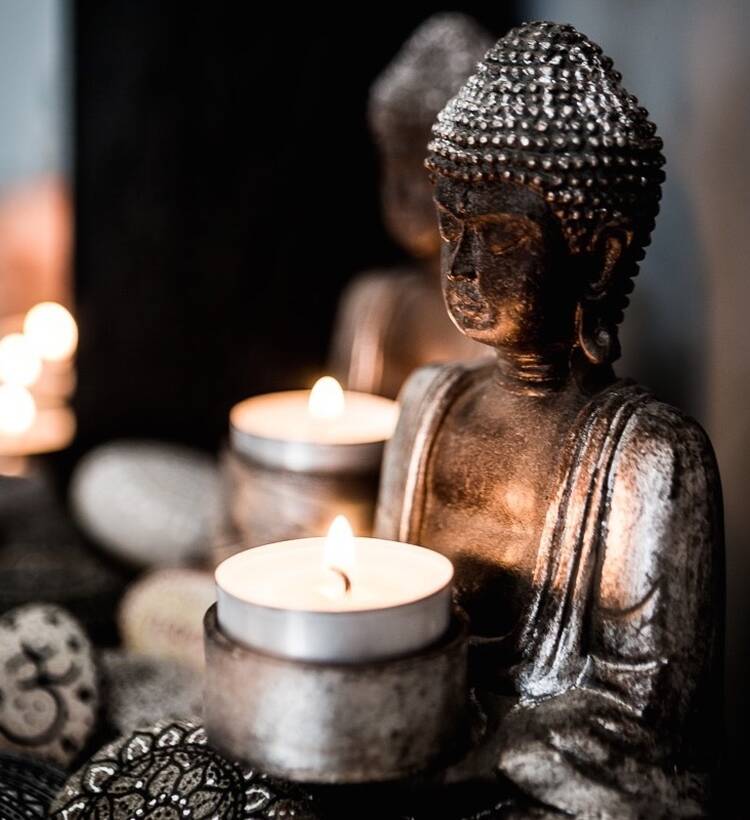
Mindfulness or Meditation?
We hear these two words as if they are interchangeable, these days. But what do we mean by the two M’s and how can we use them to enhance our daily lives?
I am trained to teach Meditation. I am not trained to teach Mindfulness. But I am interested in the relationship between the two and what sets them apart, especially as Mindfulness has become such a buzz-word in recent years. And sometimes the two words are put together Mindfulness Meditation… what is that, I wonder?
I began my two years Meditation Teacher Training at the Dru Yoga centre in Bethesda in November 2013, the weekend after I graduated from my Yoga Teacher Training, as, for me, Yoga and Meditation are inseparable practises. My yoga postures prepare my body and mind for Meditation. That is the true purpose of yoga. I have been meditating for 20 years on and off and these days, I definitely consider my time on my Meditation cushion to be the most important part of my day.
So, what is the difference between the two M’s?
From my understanding, Meditation is usually a SEATED PRACTISE, where we purposefully stop what we are doing and sit down, make our spine tall, close our eyes, withdraw from the outer world and explore our inner world. We try to settle the mind, breath and body into a level of stillness that is an antidote to our busy, busy lives and the distracting ‘Monkey Mind’.
Mindfulness is more about being PRESENT in any given moment. It can be when you’re driving or sitting in a traffic jam late for a meeting, taking a breath when your toddler won’t get dressed in the morning, or being present with your own truth just before you to step into an important conversation.
Meditation is more about finding your inner stillness, and sitting with the essence of who you are and then going into your day more centred and calm. Mindfulness is more about tapping into that inner calm in moments throughout the day, while doing other activities, to keep you on track.
The two are not mutually exclusive; we can use both practises together quite seamlessly.
So, where has Mindfulness sprung from?
Mindfulness began its journey through Buddhist and Tibetan meditation techniques and teachings. It is one of the Eightfold Path of Buddhism.
Gil Fronsdal from the Insight Meditation Center in California says,
‘While mindfulness can be practiced quite well without Buddhism, Buddhism cannot be practiced without mindfulness. In its Buddhist context, mindfulness meditation has three overarching purposes: knowing the mind; training the mind; and freeing the mind.’


For those Westerners who shy away from any Eastern influence, the word ‘Mindfulness’ has become acceptable because it has become devoid of any esoteric meaning; it is a phrase now brought, almost casually these days, into the workplace, prisons, clinics and schools to reduce stress levels.
Research has consistently found benefits in the psychological health of people who practise mindfulness. The shift in perspective from the spiritual to the scientific, began in the 1970s, when Mindfulness was brought more into the realm of Clinical Psychology and Psychiatry to help with stress, anxiety and depression, drug addiction and to enhance athletic performance, amongst other things.
One of the founders of the current movement of Mindfulness in the West is Jon Kabat-Zinn, who actually studied with Zen Buddhists but then in 1979 he founded The Stress Reduction Clinic in Massacheusetts, coined the phrase Mindfulness-Based Stress Reduction and removed the Buddhist framework from his work. Integrating the Buddhist teachings with science, he then decided to "apply mindfulness within a scientific rather than a religious frame" (according to Wikipedia).
However, in his book, ‘Wherever you go, There You are’ he says,
‘The key to this path, which lies at the root of Buddhism, Taoism and Yoga…. is an appreciation for the present moment and the cultivation of an intimate relationship with it through a continual attending to it with care and discernment. It is the direct opposite of taking life for granted.‘
I love that, IT IS THE DIRECT OPPOSITE OF TAKING LIFE FOR GRANTED… BINGO!! There it is, in a nutshell.
Here in North Wales, Bangor University has the first university-based
Mindfulness Centre in the UK and trains people from all over the
country to take Mindfulness into a huge variety of professional
environments. Look them up for more information. Or just try to move
through your day like Jon Kabbat-Zinn....
Mindfulness is awareness that arises through paying attention, on purpose, in the present moment, non-judgementally
Jon Kabbat-Zinn
Photo Credit: All photos by Desh Kapur.